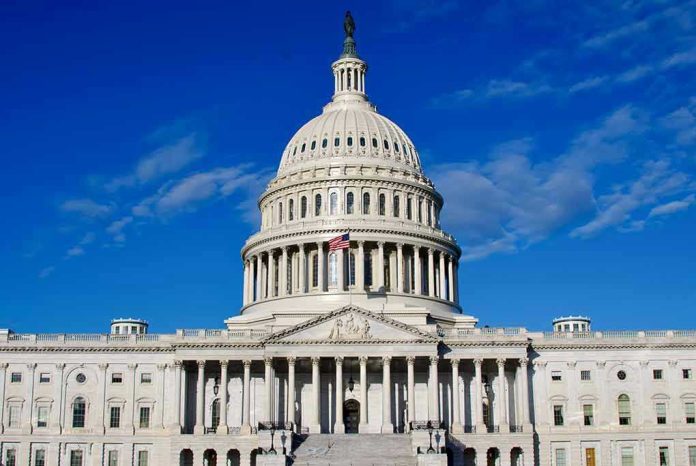
One sentence from the president has launched a political grenade: “Terminate the filibuster.” What if that’s the key to saving or dooming the nation?
Story Snapshot
- Trump’s demand to end the filibuster electrifies Republicans—and terrifies Democrats.
- The filibuster, once a sleepy procedural relic, is now the front line in America’s fight over power.
- This political maneuver could redefine how laws are made and who gets to make them.
- What happens next may change the country’s political DNA for decades.
Trump’s Rally Cry and the Republican Dilemma
Donald Trump did not merely suggest; he commanded: “TERMINATE” the filibuster. He accused Republicans of being “WEAK AND STUPID” if they refuse, warning that the very “survival” of the United States hangs in the balance. To Trump’s loyalists, this latest call is both a challenge and a loyalty test. Ignore it, and you risk being labeled a traitor to the cause. Obey, and you join what could be the most consequential power grab in modern congressional history.
Trump’s stance isn’t new, but the stakes have never felt higher. The filibuster requires 60 Senate votes to end debate on most legislation, making it a powerful tool for the minority party to block bills. Trump’s argument: Democrats would scrap it in a heartbeat if given the chance, so why shouldn’t Republicans act first? For GOP lawmakers, the choice is stark—play by established rules, or break them to keep up in a rapidly escalating political arms race.
The Filibuster: Relic or Republic-Saver?
The filibuster dates back to the early 19th century, originally designed as a safeguard for minority rights in the Senate. Proponents argue it forces consensus and prevents radical swings in policy. Critics, now amplified by Trump, call it a dinosaur—a shield for gridlock and an excuse for legislative cowardice. The debate has grown louder as Congress lurches from one stalemate to another, with landmark bills on immigration, voting rights, and gun control all falling victim to the 60-vote rule.
The filibuster’s defenders see themselves as the last bulwark against mob rule, warning that its removal would allow whichever party is in power to steamroll the opposition. Opponents counter that the Senate’s very design already protects minority voices, and that the filibuster has devolved into a weapon for endless obstruction. Trump’s insistence that ending the filibuster is the only way to “save” America pushes this conflict to a fever pitch.
Political Calculus and Conservative Values
Trump’s argument resonates deeply with conservatives who feel under siege from rapid social and legislative changes. The message is simple: Democrats do not hesitate to use every tool at their disposal; Republicans must do the same or face extinction. This logic appeals to the base’s sense of urgency and perceived unfairness in the political arena. However, some traditionalists within the party recoil at the idea of abandoning a core Senate tradition, fearing short-term gain could lead to long-term loss if the balance of power shifts.
Trump frames the filibuster as a test of Republican strength and resolve. “Don’t be WEAK AND STUPID!” is not just an insult—it’s a rallying cry for a new era of bare-knuckle politics. The underlying assertion is clear: American values are under threat, and only bold, decisive action can preserve them. For conservatives, the dilemma is profound—risk the nation’s foundational principles, or risk being left behind in a political world that rewards aggression over tradition.
What Happens If the Filibuster Falls?
Ending the filibuster would instantly empower the majority party to pass sweeping legislation with a simple majority. The consequences are impossible to predict, but experts agree the stakes are enormous. Landmark laws—potentially on abortion, elections, gun rights, and more—could sail through or collapse in a single session. The Senate would become more like the House, where the majority rules absolutely. For Trump’s supporters, this is the only way to break the current deadlock; for opponents, it’s the end of meaningful debate and compromise.
As the 2024 election cycle heats up, the filibuster debate is set to become a defining issue. Trump’s pressure campaign ensures Republicans cannot ignore the fight. Will they heed his call, or cling to the old rules at their peril? The answer may determine the trajectory of American politics for a generation.
Sources:
‘The votes aren’t there’ to kill filibuster, Thune says







